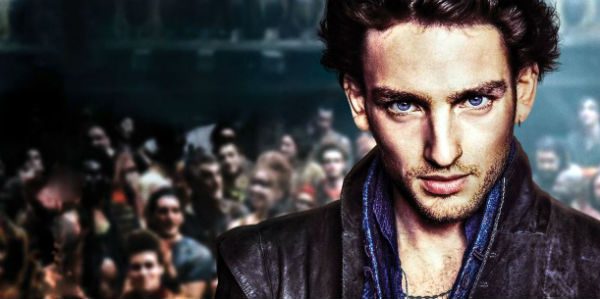“Will” proved me wrong, and I couldn’t be happier.
Tonight, Monday, July 31, at 11 p.m. ET/PT, TNT’s Shakespeare drama “Will” hits the halfway point of its 10-episode first-season run. All the episodes are currently available via On Demand and at TNTDrama.com, if you have a cooperating cable provider.
After seeing the first four episodes, I was intrigued but didn’t hold out much hope for the show — but I ended the run as a fan.
First, some background for those who haven’t seen it yet (and let me say up front, it is for adult audiences ONLY).
“Will” stars British newcomer Laurie Davidson as a twentysomething William Shakespeare, just starting his career in a punk-rock version of 16th Century Elizabethan London that includes very 21st Century clothes, makeup, hair and music — plus some language and sexual content.
The creator is Craig Pearce, the writing partner of Baz Luhurmann, who’s used a similar mash-up in such films as “Romeo + Juliet” and “Moulin Rouge.”
The show’s boldest claim is that William Shakespeare was a secret Catholic (not all scholars believe that, but many do); that he was involved with underground Jesuit priest and writer Father Robert Southwell, played by Max Bennett (they surely knew and were influenced by each other, and may have been cousins, but more distant than the show implies); and that both these things put his life in constant peril.
Will’s chief frenemy is fellow playwright Christopher “Kit” Marlowe (Jamie Campbell Bower), portrayed as a tortured agnostic/atheist/Catholic seeker, a gay sexual libertine, and a spy for the Queen’s chief Catholic-hunter, Richard Topcliffe (Ewan Bremner).
As outrageous as the Kit character may seem, it’s probably no more outrageous than Marlowe’s real life, which was brimful of sexual and political escapades. Bower plays him as a blend of David Bowie and Mick Jagger, but Marlowe probably lived a life even more daring and salacious than either rock star.
At the beginning, the biggest fail seems to be the character of Alice Burbage (Olivia DeJonge) — the daughter of theater owner James Burbage (Colm Meaney) and sister of womanizing actor Richard Burbage (Mattias Inwood) — whose feminist escapades seem thrown in to please modern sensibilities. But her story takes a startling turn.
At this point, linear viewers have only seen a few episodes, whereas some of the audience may have seen some or all of the series. This makes it a bit tricky to have a lengthy discussion about the themes without acting as spoiler.
So, I’ll hold the big conversation for September, but I recommend that mature Catholics overlook some of the show’s racier elements and hang in.
Here’s why …
IT’S ROOTED IN REALITY AND ABOUT SOMETHING …
Unlike the even more racy and violent “Game of Thrones,” “Will” is rooted in the reality of the Elizabethan Age. And it’s resolutely about real things — Catholicism, conscience, censorship and art — and the essence of the setting is based in fact.
Modern trappings and multicultural casting notwithstanding, Elizabethan London was as rough, noisy, raw, filthy, spectacular, squalid and freewheeling as the London in “Will.” Most depictions of the Elizabethan era are substantially sanitized for our (and the queen’s) protection.
THE DANGER IS ALSO REAL
One thing often scrubbed from movies about the Virgin Queen is Elizabeth I’s vicious persecution of Catholics, which some TV reviewers of “Will” have poo-poohed, saying it wasn’t that bad. In conversation last week at a press event with TNT/TBS head Kevin Reilly (more on that later), he disputed that, saying, “it was that bad.”
From an article in the U.K. Telegraph:
“Without torture I know we shall not prevail,” Elizabeth’s spymaster, Sir Thomas Walsingham, told her chief minister, Lord Burghley; and the chief torturer, Richard Topcliffe, as sadistic as any officer of the Gestapo or the Soviet NKVD, delighted in his vile work. He raped one prisoner, Anne Bellamy, after she had been racked and betrayed 26 people, including her parents. All was far from being sweetness and light in the first Elizabethan Age.
If Shakespeare was indeed a Catholic, he was deep in enemy territory, surrounded by informers and spies.
WILL’S CATHOLIC STRUGGLE BETWEEN VIRTUE AND TEMPTATION IS REAL
The show returns over and over again to Will’s struggle with his Catholic faith, as he succumbs to temptation, then is overwhelmed with guilt and a sense of duty.
Anyone who’s ever left the warm embrace of family and parish and headed to the bright lights of the big city knows all too well how quickly and hard one can fall. But the question is, how do you get back up?
WILL’S WORK AND FAITH ARE INSEPARABLE
Will’s faith suffuses his work, along with his essential goodness. Ironically, that’s irresistible to Marlowe, who subscribes to the self-destructive notion that an artist must live on the edge of morality, must dance with dark forces, in order to create. A light lives within Will, and no matter how far down Marlowe sinks, he keeps turning back to that light.
At one point, Marlowe asks Will how he continues to believe. Will answers, “I can’t stop. It’s a sickness,” and Marlowe says, “Infect me.”
EVERYBODY GETS TO BE HUMAN
In contrast to the tortured Kit, Topcliffe is a complete villain, and yet, there are reasons why he’s the way he is. Will seeks to understand the monster inside the man, without excusing a single bit of the evil Topcliffe causes. That understanding could help him bring down Topcliffe in a dramatic and unusual way.
By the end of 10 episodes, each character has passed through a kind of hell and emerged on the other side — some chastened, some gifted with faith, some lost, some redeemed, and some apparently irrevocably damned.
Even characters that start out cartoonish have their moments of real human heart and dignity.
Conversely, Southwell, who was canonized by Pope Paul VI, is made a full human being. He’s no hypocrite, and he means no harm, but his missionary zeal comes with a cost, usually to those who protect him (but in real life, Southwell was eventually martyred).
THE MODERN TRAPPINGS ARE ULTIMATELY JUST TINSEL
Honestly, the least interesting parts of “Will” are the anachronistic modern elements. The deeper I got in, the more I thought of them as a bone thrown to the Millennial audience, that the show could easily have done without.
IN CONCLUSION …
I was more moved and touched by “Will” than I expected. The depictions of Catholicism are respectful and affecting — we see one character essentially fall in love with the Faith while witnessing a sacrament.
It’s an irony that Catholicism, usually a stately and introspective faith, often fares best in stories that are done in bold strokes, with danger, violence and a stark battle between good and evil.
Count “Will” along with “The Young Pope” and “The Exorcist” as deeply Catholic shows for which I had no hope, but which won me over.
Image: Courtesy TNT
Don’t miss a thing: head over to my other home, as Social Media Manager at Family Theater Productions; and check out FTP’s Faith & Family Media Blog.














